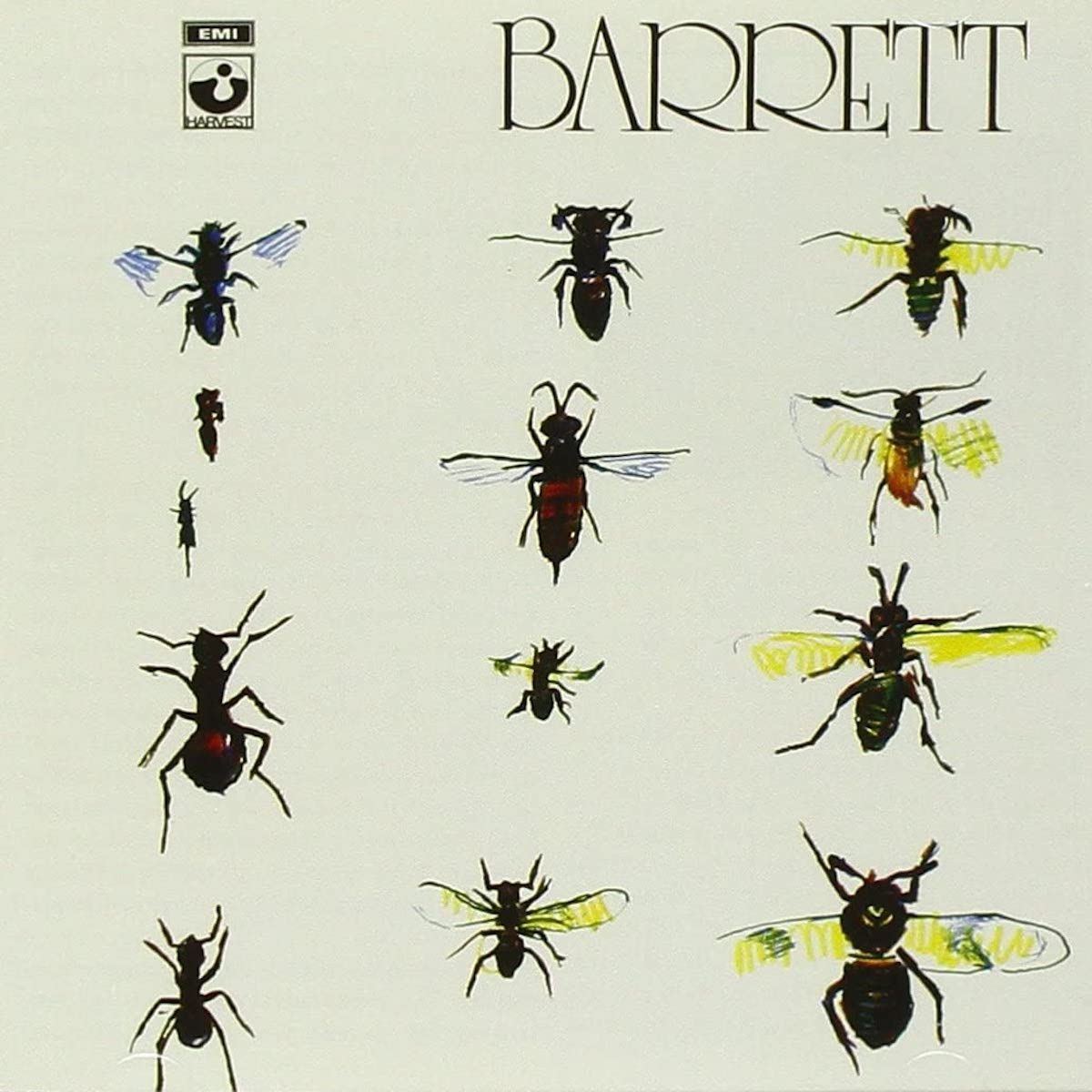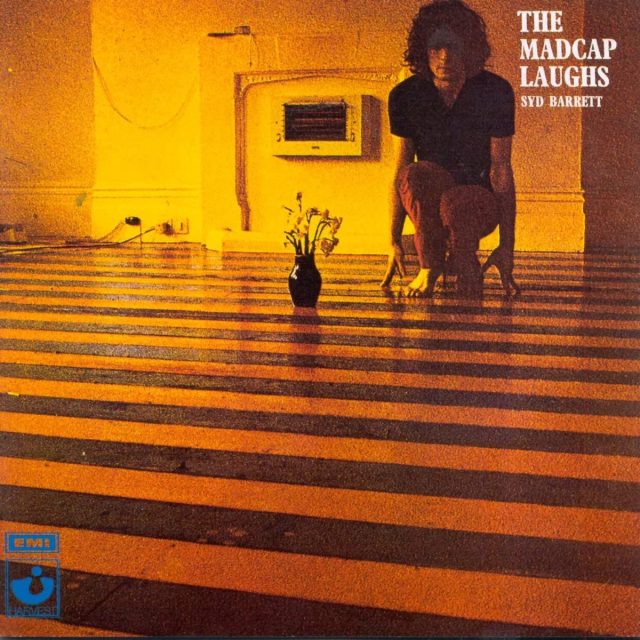 Here are two albums I desperately wanted to define me at 17. Good gawd. Thirty years on, I intend to go through Pink Floyd founder Syd Barrett’s two stark, beautiful solo albums with more sophisticated ears, a lot of life experience and heaps of perspective. And then I’ll do something fun — reimagine the 1969-’70 Floyd albums as though Syd were still contributing to the band.
Here are two albums I desperately wanted to define me at 17. Good gawd. Thirty years on, I intend to go through Pink Floyd founder Syd Barrett’s two stark, beautiful solo albums with more sophisticated ears, a lot of life experience and heaps of perspective. And then I’ll do something fun — reimagine the 1969-’70 Floyd albums as though Syd were still contributing to the band.
The Madcap Laughs begins with Terrapin, a song I’m reminded of every time I see a GMC Terrain in traffic. It’s the song I would show anyone who was curious about what Barrett’s solo material sounds like. It has all the hallmarks — audible pick strums, creative, endearing and original lyrics which have lines of child-like simplicity and others which are syncopated and psychedelic, sometimes sounding quite fragile, not terribly well-rehearsed and difficult to follow. It’s a sweet and intimate love song.
No Good Trying is perhaps the best example of a rarer kind of Barrett song — the band-backed rocker. The band in this case is fellow Cambridge pals The Soft Machine. No easy feat, because the backing band was added afterward to the Barrett guitar/vocal bed track. I really feel for drummer Robert Wyatt.
Love You is a sweet, fun and very together romper featuring the same backing band. No Man’s Land is a bit weirder, darker and disjointed. Unlike Love You, this one really sounds like the band has been added afterwards. In this case that’s bassist Willie Wilson and drummer Jerry Shirley. I’ve always wanted to know what Barrett is saying in the barely audible spoken bit at the end, beginning with “tell me, tell me, tell me…”
Then it’s Dark Globe, a magnificent, fragile Barrett song. One of my favourites, and nicely covered by R.E.M. in 1989 and issued on a flexi-disc. Its plaintive “Wouldn’t you miss me?” chorus is absolutely haunting. Here I Go wraps up the first side, another of those charming almost novelty ones like Love You and, later, Effervescing Elephant.
Side 2 begins with the album’s single — Octopus. Originally called Clowns & Jugglers, the song is catchy and great despite the fact that I imagine it gives many musicians anxiety due to the fact that it repeatedly seems like it could fall apart at any second. I believe the band here is David Gilmour on everything, including drums, which he recorded the day after Barrett put down the vocal and guitar.
Next is the James Joyce poem Golden Hair, set to simple but effective music by Barrett. I never really cared for this one. Long Gone follows, with its very well-recorded acoustic guitar (it is Abbey Road, after all). I’m not convinced this isn’t also Gilmour. I know he plays 12-string on the record. This one is similar to Dark Globe, and nearly as good.
The next ones are shaky — She Took A Long Cold Look and Feel. Barrett seems not entirely familiar with parts of Feel. Long Cold Look has an audible stop-and-flip-the-lyric-page bit. I suppose, with his failing mental health, just getting Syd in a studio with new songs was an achievement in itself. Expecting him to try multiple takes was simply asking too much. Barrett struggles to sing If It’s In You and I can’t decide if the false start should have been left out. It’s a bit sad, because what follows is tragically unrehearsed and very fragile.
The last song has heaps of production compared to the previous songs. Late Night is one of those sweet, apologetic and alienated Barrett songs. It’s a very good album-closer choice.

By all accounts, the followup solo album Barrett was a much more difficult album to complete. But, props to co-producers Gilmour and Rick Wright, because it really doesn’t sound like it. In many ways, Barrett is far more “together” sounding than its predecessor.
The opening track Baby Lemonade is a great example. They took a snippet of Barrett warming up on guitar and used it as an intro to what is both a dark and catchy song. This, like many of the songs on the album, comes from a first take, and was hugely embellished by Gilmour, Wright, Shirley and Weeks.
Love Song is much the same, and another Take 1 song. There’s a long instrumental ending because Barrett actually abruptly stopped playing. Dominoes is a little more polished — it’s Take 3! It features some cool backward guitar and has some of the most anguished lyrics on the album. That’s Gilmour on drums, with the band covering up another abrupt ending.
It Is Obvious is one of my favourite Barrett songs. I’m not even sure why. It’s just a vamp with startlingly good lyrics overtop. Rats follows. I’ve always found this one too awkward and loose to really work. It’s a jam and not much more. While It Is Obvious was the third Take 1 on the album so far, Rats wasn’t even a take. It’s just a demo.
The first side ends with the monotonous blues tune Maisie. Barrett mumbles the words and even snickers at one point. It’s the last thing Barrett should be: Boring. Believe it or not, this is not the first take (it’s the second, lol).
So, after limping out of the first side, the second starts with perhaps Barrett’s greatest solo song, Gigolo Aunt. It’s tight, cool, catchy and confident.This being “Take 15” might tell you the story of why. Waving My Arms in the Air/I Never Lied to You is/are up next. Basically both are Take 1, except the vocals were re-done.
The album’s other well-rehearsed song is Wined And Dined, a Take 10. Again, it shows. A beautiful Barrett song — opening with the lovely chorus and then to the clever verses. Syd’s fragile slide guitar overdubs are classic Barrett.
I’ve never really been consistent with my feelings on Wolfpack. It’s extremely loose, but strongly sung by Barrett — with effective double-tracked vocals and his phrasing is so damn great in places. The lead guitar overdubs are also very cool — and I suspect, performed by Gilmour.
The closing track is the perfect and sweet Effervescing Elephant, a song Syd had been singing at parties and to friends for years. It’s almost like voice artist work, with guitar and tuba. This was a young man with a brilliant, playful musical brain. Take 9, so it’s quite tight — recorded on July 14, 1970, the most productive day of the sessions by a long shot. Four songs were done that day alone. I rate both albums 4/5.
Now, let’s imagine Syd never left Pink Floyd — something which technically occurred in April 1968 but effectively happened earlier. The band recorded the Wright-penned single It Would Be So Nice in February 1968 with Gilmour instead of Barrett.
I think it’s necessary to proceed as though Barrett would be a Brian Wilson-like participant, as the band initially had hoped. The notion was that he would contribute as often as he liked and they would do their best with the material and fill in the rest themselves. Barrett is only on three songs on the sophomore Saucerful Of Secrets — his own Jugband Blues, Set The Controls For The Heart Of The Sun (which features all five members — the only Floyd track which does!) and slide guitar on Remember A Day. The Barrett-penned In The Beechwoods was recorded but left off the album.
By the end of May — less than two months after it was announced he was no longer in the band — Barrett began recording what would become The Madcap Laughs. There were three different sessions. The first took place from May 28 to July 1968, recorded by Floyd’s first manager Peter Jenner. Barrett had a breakdown and Jenner refused to continue, so Malcolm Jones agreed and began working with Barrett in April. After following Floyd to Ibiza, Barrett asked Gilmour to take over from Jones, which he and Roger Waters did from July to August 1969.
That being the case, we’ll consider the first Madcap sessions together with the sessions for the More soundtrack, recorded by Floyd in January and February 1969 but leave out the single Point Me At The Sky/Careful With That Axe, Eugene, recorded in December 1968 and the February 1968 recordings of It Would Be So Nice/Julia Dream (the first song where Gilmour sang lead vocals). I will, however, include Biding My Time — from July 1969 — which was unreleased until the 1971 Relics compilation. It features Wright on trombone!
We’ll pretend these are the sessions for a single album called The Madcap Laughs More.
The next string of congruent studio sessions would include the remainder of the Madcap album and the unreleased track Opel, as well as the Floyd sessions for the studio portion of Ummagumma and the track Embryo. We’ll make a new studio album called Opelgumma and forget most of the crummy experimental, individual studio stuff from Ummagumma. The live part of that album could have been released as a standalone record, as it should have been anyway.
Finally, we’ll combine some of the stuff from the Zabriskie Point soundtrack, recorded November and December 1969, with the better songs from Barrett’s self-titled second solo album, recorded between Feb. 26 and July 21 1970. I would include Two Of A Kind, from the John Peel BBC session he did on Feb. 24, 1970, but it’s not on Spotify. We’ll call this album Gigolo Pigmeat. I’ll leave Atom Heart Mother, recorded March 1 to July 26, alone.
Barrett went on to do another BBC session for Bob Harris’s Sounds of the Seventies show on Feb. 16 1971. He performed Baby Lemonade, Dominoes and Love Song. They all appear on the 2004 album Radio One Sessions, though some bootleg copies have better-quality sound.
His last studio sessions were at EMI Studios (Abbey Road) for three days in August 1974. He recorded 11 tracks — 10 of which were untitled, except for If You Go, Don’t Be Slow.
Nothing came of it and he eventually left London for his home town of Cambridge. Roger “Syd” Barrett died July 7, 2006 of pancreatic cancer.
Shine on.











































